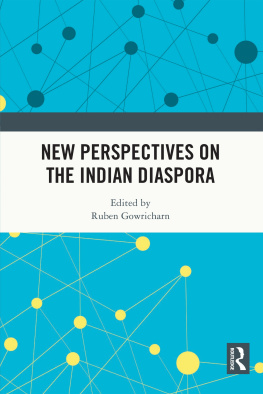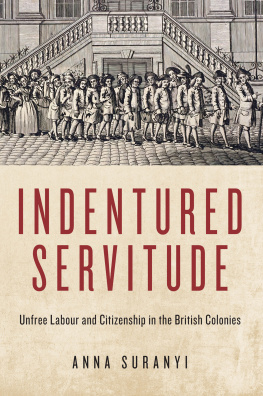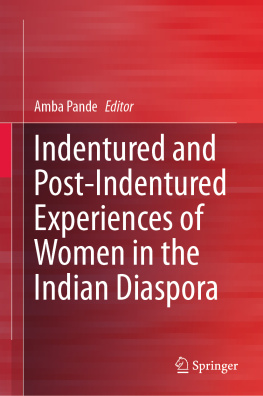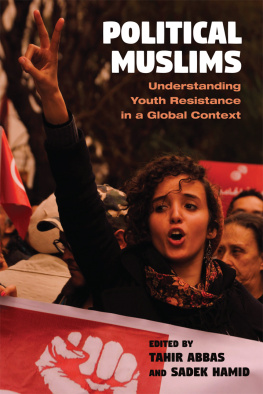INDENTURED MUSLIMS IN THE DIASPORA
Indentured Muslims in the Diaspora
Identity and Belonging of Minority Groups in Plural Societies
Edited by
Maurits S. Hassankhan
Goolam Vahed
Lomarsh Roopnarine
First published 2017
by Routledge
2 Park Square, Milton Park, Abingdon, Oxon OX14 4RN
and by Routledge
711 Third Avenue, New York, NY 10017
Routledge is an imprint of the Taylor & Francis Group, an informa business
2017 selection and editorial matter, Maurits S. Hassankhan, Goolam Vahed and Lomarsh Roopnarine; individual chapters, the contributors; and Manohar Publishers & Distributors
The right of Maurits S. Hassankhan, Goolam Vahed and Lomarsh Roopnarine to be identified as the authors of the editorial material, and of the authors for their individual chapters, has been asserted in accordance with sections 77 and 78 of the Copyright, Designs and Patents Act 1988.
All rights reserved. No part of this book may be reprinted or reproduced or utilised in any form or by any electronic, mechanical, or other means, now known or hereafter invented, including photocopying and recording, or in any information storage or retrieval system, without permission in writing from the publishers.
Trademark notice : Product or corporate names may be trademarks or registered trademarks, and are used only for identification and explanation without intent to infringe.
Print edition not for sale in South Asia (India, Sri Lanka, Nepal, Bangladesh, Afghanistan, Pakistan or Bhutan)
British Library Cataloguing in Publication Data
A catalogue record for this book is available
from the British Library
Library of Congress Cataloging in Publication Data
Catalog record for this book has been requested
ISBN: 978-1-138-28050-2 (hbk)
ISBN: 978-1-315-27203-0 (ebk)
Typeset in Minion
by Ravi Shanker, Delhi 110 095
Contents
- 1. Islam and Muslims in South Asia in the Nineteenth and Twentieth Centuries: Revolt, Revivalism, and Accommodation
GOOLAM VAHED
- 2. Social Transformation among Muslims in Contemporary Mauritius
AMENAH JAHANGEER CHOJOO - 3. Indian Muslims in South Africa: Historical and Contemporary Perspectives, 1860-2013
GOOLAM VAHED
- 4. Hindustani Muslims in Guyana: Tradition, Conflict and Change, 1838 to the Present
RAYMOND CHICKRIE AND BIBI HALIMA KHANAM - 5. Identity and Acculturation of Trinidad Muslims: An Exploration of Contemporary Practices
HALIMA-SA'ADIA KASSIM
- 6. Islam and Indian Muslims in Suriname: A Struggle for Survival
MAURITS S. HASSANKHAN - 7. The Development of Islam amongst the Javanese in Suriname
STANLEY L. SOEROPAWIRO - 8. Islam in Fiji: Continuity, Adaptation and Change during the Indenture and Post-Indenture Periods
ZAKIA ALI-CHAND, SHAZNA BUKSH AND AFSHANA ANZEG
- 9. Muharram in Diasporic Settings in the Twenty-first Century
GOOLAM VAHED
This volume forms the fourth and final publication originating from the conference Legacy of Slavery and Indentured Labour: Past, Present and Future, which was organized in June 2013 by the Institute of Graduate Studies and Research (IGSR) at the Anton de Kom University of Suriname, in collaboration with a number of government and nongovernmental organizations. Following the abolition of slavery in the British West Indies in 1834, the sugar plantations in the region were faced with a severe labour shortage as most of the freed Africans refused to work beyond their apprenticeship period following emancipation. This created a crisis as plantation owners had invested large sums of money in the production of raw materials. They were forced to seek alternative sources of cheap labour and the majority of these 'replacements' were recruited from the Indian subcontinent as indentured migrants.
In total, some 1.3 million Indian contract labourers were exported to colonies such as Mauritius, Jamaica, British Guiana, Trinidad, St. Lucia, Granada and Natal from the middle decades of the nineteenth century to satisfy the demand for cheap labour. Notwithstanding the tendency of the various states to treat Indians as a homogenous entity, they were extremely heterogeneous with clear differences of class, caste, religion, language and experiences of migration within colonies as well as between colonies. These differences form as much a part of the Indian indentured experience as the story between Indians and white settlers, the descendants of African slaves, and indigenous peoples.
The aim of the conference hosted by the IGSR was twofold: to connect the historical specificities of slavery, indentured labour and migration to contemporary issues of globalization, diaspora, identity formation, nationalism and transnationalism and to promote new perspectives and approaches in the study of forced and free migration and its impact on receiving societies. By bringing together scholars from various parts of the world, both senior scholars who are well established ones in the field as well as younger, emerging ones, the organizers hoped to stimulate an exchange of ideas, strengthen existing research networks and establish new ones so that the baton of research can be passed on to a new generation.
Participants considered a host of issues around slavery, indenture, migration, transnationalism and identity formation. This included such things as post-slavery identity formation in different slave colonies; the psychological impact of slavery and indentured labour for the descendants of slaves and indentured migrants; transnational identities of people connected to their imagined or real relations with their country of origin and with others in the 'diaspora'; whether secondary migrants ('twice diaspora') perceived their country of origin or India as 'home'; also as to how they have been received by various countries; whether transnational ties and identities are recognized and institutionalized by the state; and other such issues.
Participants received extensive feedback at the conference and were invited to review and revise their respective contributions and submit them to the organizers of the conference for consideration for publication. While some presenters chose not to, or were unable to, submit their papers, for various reasons, the conference organizers received a rich and diverse range of papers. Once they selected the papers that they wished to publish, these were grouped thematically, sent out for blind peer reviews, subjected to further revisions by the respective authors, and published in 2016 by Manohar in a four volume series titled 'Legacy of Slavery and Indentured Labour'.
- Legacy of Slavery and Indentured Labour: Historical and Contemporary Issues in Suriname and the Caribbean, edited by Maurits S. Hassankhan, Lomarsh Roopnarine, Cheryl White and Radica Mahase.
- The Legacy of Indian Indenture: Historical and Contemporary Aspects of Migration and Diaspora, edited by Maurits S. Hassankhan, Lomarsh Roopnarine and Hans Ramsoedh,
- Social and Cultural Dimensions of Indian Indentured Labour and its Diaspora: Past and Present, edited by Maurits S. Hassankhan, Lomarsh Roopnarine and Radica Mahase.









